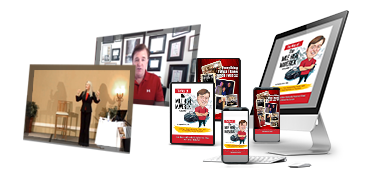Building an online presence takes a lot more than setting up a social media profile. There are many nuances to growing your presence and brand online. From advertising and online engagement to brand positioning, outreach, and more, central to nearly all online efforts are financial advisor websites.
Got a website yet? If not, you’re missing out!
It’s never too late to build a website and establish a strong brand online. Our article shares the basics of setting up a site for yourself and/or a wealth advisory agency.
Let’s get to it.
The Importance of Financial Advisor Websites
Why do you need a website when there are already platforms like LinkedIn? Why go through the trouble when you could set up Google My Business, Facebook, and others?
That’s actually a great question…
…and honestly, you can do just fine with social media and online profiles.
However:
Building a website for your financial advisory business, or the agency you work for, lets you do so much more than what’s possible through free online platforms. You’re the one in control of what’s published, how it’s distributed, and its growth potential.
A site is an asset you build — think of it on-par as your physical location.
With a site you can:
- Pitch services and products to those who discovered your site
- Show up in search and promoted results for targeted keywords you’re going after
- Share updates, news, and interesting tidbits with followers which makes you the expert
Everything you do online can point back to the website you’ve built, too.
The website is a central “hub” of your online marketing and advertising. It’s integral to creating success.
By radiating from the site, you’ll build its value while also growing your brand and authority. The site is symbiotic to all the online “stuff” that you do to get found, generate more sales, and support clients.
So, when you think something like, “why is a financial website important?”, just remember that it’s a considerable aspect of your online presence and market/industry placement.
Option #1: Creating a Site From Scratch (ie. Coding)
Building a website from scratch most difficult learning curve of the main development options. It also carries a higher cost since much of the development is going toward learning resources and tools.
That said:
Learning how to develop your own site offers an incredible return on investment. Not only can you build a site but you’ll also develop supporting skills used in other areas. These skills range from graphic design to copywriting and more.
You’re quite literally learning how to do it all.
There are countless ways to go about learning how to get started with web design and development. One of the easiest paths when learning how to build a site is to follow e-learning courses. Two good starting options include Udemy or Coursera. You could follow blog tutorials or YouTube videos to learn the basics, too.
Check out these resources to start learning:
- The “Learn Web Development” course by Mozilla
- Exploring the many free courses at freeCodeCamp
- Picking up the basics via w3 school’s Web Development Roadmaps
You could also reverse engineer financial websites using developer tools to see how everything works. Or, swing by one of the many web development forums, online groups, and development communities for help.
All-in-all:
Knowing how to write site code and all the nuances of building one offer immense flexibility and power. But, it’s probably not the most realistic route for someone already busy handling clients and running an operation.
If you can learn as you go in your free time then that’s fantastic. Yet, you’re better offer taking one of the “shortcuts” in site development which brings us to the next part…
Option #2: Building a Site Using Templates, Plugins, and Add-Ons
Your next option for building a site is through the use of templates, plugins, and add-ons.
Templates (or ‘themes’) are available as simple HTML/CSS or catered to popular platforms.
One of the most popular site-building options is to set up through WordPress and using a theme. The concept is similar to other platforms like Wix, Weebly, Squarespace, Shopify, Magento, and others. Once you have an account or installation, you can modify the site’s design and structure from within its backend.
There are plenty of places to start your search for site themes:
- Themeforest
- TemplateMonster
- aThemes
Themes and templates are typically available as either free or paid. A free theme offers a great way to experiment with building a site without needing to put up the money. But, if you want to look professional and have unique features then your best option is to opt for a premium theme.
Once you’ve chosen a website theme/template — you will:
- Buy/setup a domain name and web hosting services
- Link the domain to the hosting
- Choose how you’ll set up the site:
- Option 1: Install a CMS/eCommerce platform
- Option 2: Upload site files directly to the server
- Configure the site’s structure and backend features
- Install additional plugins and add-ons
- Fill in content and website features
One of the coolest things about using a theme/template is that you still get a lot of control as you would building from scratch. A few tweaks to the code can totally transform a theme to your liking. And, even if you’re not hands-on, you can use plugins and add-ons that extend the functionality of the site without having to code.
Still too involved for you? You’re always welcome to use a free site builder.
A free site builder is a bit like all of this theme/site-building process. Except, you’ll use a step-by-step wizard to go through each of the core elements of building a site. You can grab themes, customize pages, and include add-ons through a free site platform. This is a great option if you want to build a site but retain some access to hands-on features.
And if even site builders are too involved? Well, there’s always…
Option #3: Having Professionals Build Your Site
You’re great at what you do.
Others are great at building websites.
Website prices have come down quite a lot since the early days when creating one was so specialized. Today, it’s a buyer’s market when it comes to financial website design and development. You can find professionals willing to set up a site for a couple of hundred dollars to upwards of a couple thousand (or more), depending on what’s needed.
Start looking for professionals via:
- Posting online job ads or recruiting through creative boards
- Freelance marketplaces like Upwork, Freelancer, or Toptal
- Referrals from business contacts and peers
Go into the site development with goals and a vision in mind. But, also trust in the judgment and expertise of those you’re hiring.
The easiest approach is to share 5-10 examples of competitors and what they do that you like. This gives the developer insights into what they could build for your website. From there, after having crafted the foundation, you can begin tweaking the features and smaller things.
Your financial website options are near limitless and only held back by your vision and budget. You can keep things simple & lean with a basic 5-page site or go big with all the bells & whistles. The important thing is to create a structure that lets you scale when needed while not being a burden to maintain.
One last thing to keep in mind:
Working with a professional also gives you access to their expertise and network. A site developer likely has (at least) some knowledge of areas like online marketing, site optimization, content creation, and more. Else, they likely know those that can fill those gaps if asked. This sets you up for success since you now have the resources to grow!
Personalizing and Customizing a Site to Reflect Your Brand
Building a site is one thing.
Molding it into something that reflects your personality and culture as a financial advisor is another.
The subtleties of a website are the thing that truly hooks people in. Often, these elements are so well integrated that most don’t realize they’re there. But, they are… and they help convince & convert visitors into choosing YOU for financial services.
What can you do to personalize and customize the site? Consider these elements:
- Tone — Create and share content that reflects your tone and expertise. Keep it natural as if you’re talking to a person instead of spouting sales talking points. Doing so gives the content a unique feel and personality.
- Media — Integrate more of your business such as using real photos instead of stock media. This makes your content relatable because people see and hear who you are vs making an assumption.
- Local — Get local with your efforts by using call-outs and references to your town/city. Let the small, unique side of your business shine by being the local you are. This can do wonders for helping you stand out among faceless corporate players.
You can also try things that will add engaging options like:
- Translation plug-ins to overcome the language barriers
- Dynamic content that adapts through behavioral data
- Personalized product/service recommendations and up-sells
- Custom messages through on-site, contextual messaging
With finesse, these features will be integrated into the site from the get-go. The result of this integration is a financial advisory website that feels synonymous with your brand’s identity. People interacting with the site will feel as if they’re experiencing exactly what it’s like to engage with you.
Build Toward Your Success With a Great Online Presence
Financial advisor websites offer an incredible opportunity for those who put the effort into them.
When a site is high-quality, well maintained, and brimming with great content, it works its magic converting those visiting into clients and customers. With a site, you also gain a better position within your market/industry. And, you create a “hub” that builds upon all other areas of your online marketing and advertising efforts.
There’s really no drawbacks when it comes to having a website!
So, what’s holding you back from breaking through to new heights of success? Let’s connect and work together in growing your financial advisory and/or wealth management business, today. Through expert business evaluations, courses, books, seminars, and more, you’ll be on the right track to success.
Schedule a FREE business evaluation (and receive bonus materials) today at 1-303-808-8719.




